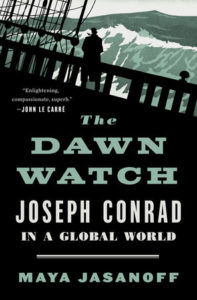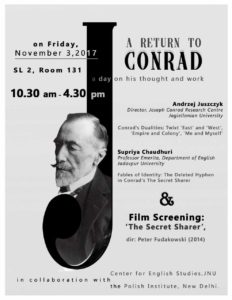Józef Teodor Konrad Korzeniowski / Joseph Conrad
 Heart of Darkness remains one of the most widely read novels in English; and the movie adaptation Apocalypse Now has brought Conrad’s story to still more. The very phrase has taken on a life of its own. Conrad’s book has become a touchstone for thinking about Africa and Europe, civilization and savagery, imperalism, genocide, insanity — about human nature itself.
Heart of Darkness remains one of the most widely read novels in English; and the movie adaptation Apocalypse Now has brought Conrad’s story to still more. The very phrase has taken on a life of its own. Conrad’s book has become a touchstone for thinking about Africa and Europe, civilization and savagery, imperalism, genocide, insanity — about human nature itself.
It’s also become a flashpoint. In the 1970s, Nigerian novelist Chinua Achebe declared Heart of Darkness “an offensive and totally deplorable book,” rife with degrading stereotypes of Africa and Africans. Conrad said Achebe, was a “bloody racist.” Not long afterward, a half-Kenyan college student named Barack Obama was challenged by his friends to explain why he was reading “this racist tract.” “Because…,” Obama stammered, “Because the book teaches me things. . . .About white people, I mean. See, the book’s not really about Africa. Or black people. It’s about the man who wrote it. The European. The American. A particular way of looking at the world.”
I spent many happy days as an undergraduate student of literature reading whatever I could by Joseph Conrad. I even read his diaries. His minor works. Thoroughly enjoyed reading his novels. So imagine my delight when I discovered historian Maya Jasanof’s enlightening The Dawn Watch: Joseph Conrad in a Global World . It is written in the characteristic modern style of writing biographies; heavily influenced by Richard Holmes’s methodology of the biographer following in the footsteps of their subject — combining a deep understanding of their subject’s context while maintaining a modern travelogue. With the informed perspective of “two worlds” ( if you will) and the advantage of time, the biographer is also able to put together a fascinating analysis. In this particular book Maya Jasanof’s argument is that Conrad’s own life reveals him as a “prophet of globalization“.
Joseph Conrad was born Józef Teodor Konrad Korzeniowski in 1857, to Polish parents in the Russian Empire. At sixteen he left the landlocked heart of Europe to become a sailor, and for the next twenty years travelled the world’s oceans before settling permanently in England as an author. He saw the surging, competitive “new imperialism” that planted a flag in almost every populated part of the globe. He got a close look, too, at the places “beyond the end of telegraph cables and mail-boat lines,” and the hypocrisy of the west’s most cherished ideals.
In fact 2017 has been declared as the Year of Conrad by the Polish Parliament. To commemorate this occasion  the Polish Institute New Delhi in collaboration with the Center for English Studies, Jawaharlal Nehru University, is celebrating this incomparable author’s life and works through a series of lectures by two experts on the author, one from Poland and one from India, who will analyse the critical elements and themes of his writings which make them one of a kind. The lectures will be complemented by the screening of ‘The Secret Sharer’, Peter Fudakowski’s cinematic adaptation of one of Conrad’s most renowned writings .
the Polish Institute New Delhi in collaboration with the Center for English Studies, Jawaharlal Nehru University, is celebrating this incomparable author’s life and works through a series of lectures by two experts on the author, one from Poland and one from India, who will analyse the critical elements and themes of his writings which make them one of a kind. The lectures will be complemented by the screening of ‘The Secret Sharer’, Peter Fudakowski’s cinematic adaptation of one of Conrad’s most renowned writings .
Prof. Andrzej Juszczyk, the Director of the Joseph Conrad Research Centre of the Jagiellonian University will deliver a lecture on “Twixt ‘East and West’, ‘Empire and Colony’, ‘Me and Myself'”. Prof. Juszczyk will share the stage with Prof. Supriya Chaudhuri, Professor Emerita, Department of English, Jadavpur University, who will deliver a lecture on “Fables of Identity: The Deleted Hyphen in Conrad’s The Secret Sharer”. The event will be held at the School of Languages 2, Room 131, Jawaharlal Nehru University on 3rd November 2017 from 10:30 am onwards.
Joseph Conrad The Dawn Watch HarperCollins India, 2017. Hb. pp. 370
2 November 2017
